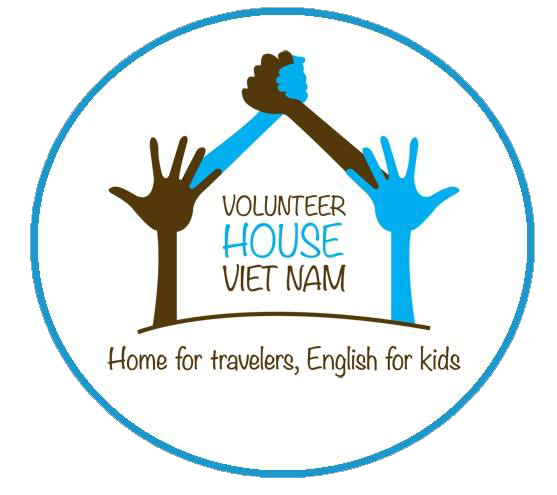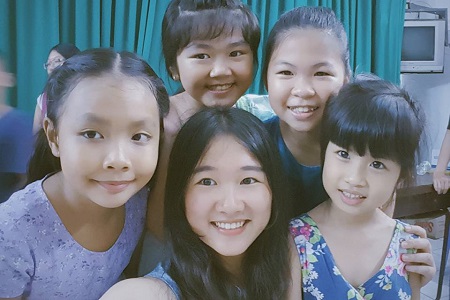Source: http://vietnamnews.vn/sunday/features/280227/travellers-take-their-time-to-give-something-back.html
[TRAVELLERS TAKE THEIR TIME TO GIVE SOMETHING BACK]
 |
| All ears: Listening and speaking lessons help the kids, especially poor ones, communicate with native speakers and improve their skills. — VNS Doan Tung |
Volunteers travelling through the country are taking time out at their own expense to lend a hand and help Vietnamese students learn to communicate in English. Minh Trang reports.
“Don’t be shy! Don’t worry!”
These words are usually resounded in a special English class, where nearly 20 pupils of Hai Ba Trung secondary school have participated for the last two months at their own school in Ha Noi.
Every Tuesday and Thursday evening, in this special class, with the English dialogues mixed in clanging laughter, the pupils happily enjoy the listening and speaking lesson led by “special” teachers as well.
These teachers are people who mostly don’t have any diplomas for teaching, or even are still university students, but their faces always show their enthusiasm and interest in teaching the kids.
All of those special things come from a project named Volunteer House Vietnam (VHV), which provides the free-of-charge English classes for children, especially poor ones.
VHV was established in February of 2015 by Vo Thi My Linh, 26, who was also propelled to fame as a survivor in the historic Nepal avalanche and blizzard on October 14, 2014.
In Nepal, Linh witnessed the lives of locals here, how they treat tourists and the admirable ability in English of poor children. Since then she had an idea of building a unique model like their country’s in Viet Nam.
This project model is based on the appeal to people all over the country to contribute free accommodations for travellers or backpackers, regardless of whether they are, Vietnamese or foreigners, who are proficient in English and able to teach English to local children.
It is also a message to send to the Vietnamese kids about the importance of learning English in modern life.
“As a person who is not very good at English, I see those who are good at the language having the chance to land well-paid jobs in Viet Nam,” Linh said. “I don’t want language to be a barrier for Vietnamese people.”
 |
| Helping hand: The pupils always receive enthusiastic and careful instructions from VHV’s volunteers. |
Linh said after coming back home, many young Vietnamese admired her. This made her think of an idea to gather them together to do this meaningful thing instead of sitting there and admiring her.
Since the project started, more than 500 volunteers from all over the country have registered to be its members; 80 free accommodations from 20 provinces of across the country have been offered to the VHV.
At present, four English classes in HCM City and four in Ha Noi were established. Each class session often lasts from 45 to 90 minutes with 15 to 20 learners aged 6 to 12.
The creators of this project also desire to create a more valuable experience for visitors, especially the first-time ones, in Viet Nam.
“I always work as a volunteer in Italy, so when I was looking for a volunteer institution on the Internet about Viet Nam, I just found VHV so easily,” said Chiara Pellegrino, 22, an exchange student from Italy and a VHV member.
“The Vietnamese pupils are great. Sometimes they are so noisy, but they are so funny. They always give me the energy which makes me enjoy myself whenever I come here. I think they really need someone good in English to talk with and if they keep on practising, they will speak perfectly.”
Because most travellers can’t stay long and the students’ learning must be continuous, the lessons are in a predetermined curriculum which is undertaken by Vietnamese teachers.
Each class often includes two to three teachers. If there are foreign volunteers, Vietnamese ones will become assistants.
To maintain this project, the volunteers of the organisation must undergo many difficulties. Expense is one of the most important issues for any volunteer projects. The cost of textbooks, materials, meetings have been paid all by the volunteers. They also rely on their relationships to borrow classrooms for free.
 |
| Helping hand: The pupils always receive enthusiastic and careful instructions from VHV’s volunteers. |
Additionally, because the volunteers weren’t trained in pedagogy before, it is not easy for them to lead a class at first.
However, seeing the excitement of students when they come to class as well as their significant progress, the members feel all difficulties seem to vanish and they always try to improve their teaching and continue this volunteering, in the hope to convey what they know about English for those who know less.
“I sent both my daughters to this class. Since they started to learn, I found their ability to speak English is markedly improved. They can communicate more confidently with foreigners and their classmates at school,” said Dinh Ngoc Thu, 33, a student’s parent from Ha Noi.
“Their eagerness for a second language has also increased. I told them many times to have a day-off, but they still insisted on going to VHV class. This makes me very happy about what VHV did for our children.” Thu added.
VHV has received the support not only from the parents, but also from those who love volunteer work.
Under the influence of Founder Linh, who sent the letter to the Vietnamese Minister of Education and Training on the issue of educating English in Vietnam compared to Nepal, Linh has appealed to the young people to devote their energy to society.
Since then, the network of donors and volunteers has increased
“I participated in this project because I admire Linh and her breakthrough ideas. I also want the kids not only to learn the culture of other countries, but also to introduce the Vietnamese cultural beauty and people for foreigners,” said Bui Thi Thanh Thuy, 23, a volunteer.
“I have received so many meaningful things after joining it. Moreover, I have a chance to contact with the talented people who dare to think, dare to do.”
After over 10 months in operation, the project has attracted more than 2,500 volunteers at home and abroad. It also aims that by 2020, all provinces and cities across the country will have at least one free English class for children, especially poor ones.
VHV is like the second house for volunteers and a dream boat which takes poor children to the shore of knowledge and the only thing they have to invest is their efforts.
In the future, to expand its influence throughout the country, the VHV will sign contracts with organisations such as AIESEC, GLC for exchanging and bringing foreign students to Viet Nam to practise and do volunteer work easier.
“There is a big need for volunteer organisations like VHV in Viet Nam because they can make something amazing and helpful for society,” said Pellegrino. — VNS
http://vietnamnews.vn




